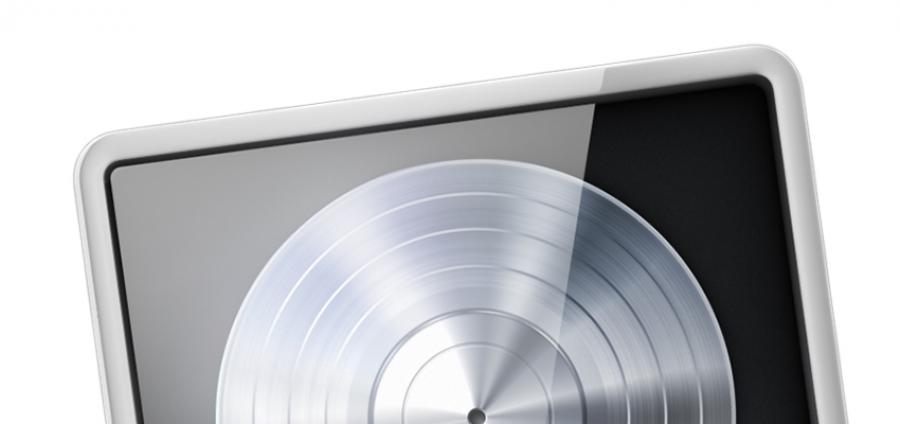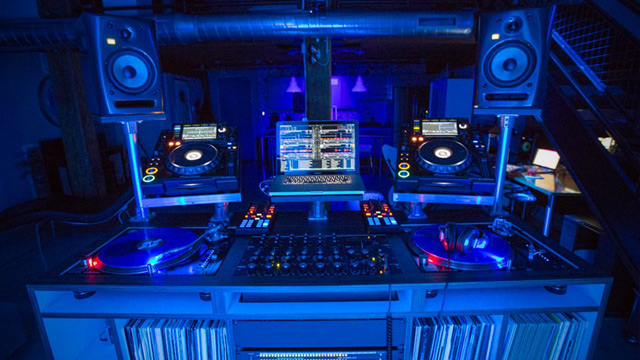
5 Reasons why the Mac is the perfect tool for musicians
So why should musicians buy a Mac?
The Coventry stores' in-store music experts, Mat and Cameron, have 5 reasons why every musician should have a Mac as their studio whip.
Since the mid 80s, computers have been a massive part of the music industry. The early Atari and Omega desktops were a massive hit for producers as they could easily sample, layer and add effects to sequenced tracks. Producers loved them for their ease of use and simplicity. One piece of software that was used on the Omega was a suite called Octamed, which allowed producers to sequence multiple tracks at a time. The old school Octamed was famously used by producer Calvin Harris back when he first came into the light in 2006. Even though at the time it was very limited, the results were impressive. Since then, music software has become a lot more complex, packing in a array of studio effects and sound libraries. In 2003 Apple and Propellerhead’s unleashed the beast, Logic Studio. Logic has since been a massive player in the production and music engineering industry for over a decade.
Unlike other DAW’s, Logic manages to balance performance and power with simplicity and ease of use. The catch, if there is any, it that it is only available on the Mac. Other popular DAWs, such as Cubase, Ableton and Reason can also be run on a Mac, or on a Windows PC. So why should musicians buy a Mac?
Here in Coventry, Mat has been writing and producing electronic music using Logic (and various old types of gear such as cassette players, reel to reel and samples from his granddads massive collection of 78 speed vinyls!) for over 8 years. His biggest success to date is his work under the nostalgic moniker Harbor Tea Rooms, with three albums and a fourth on the way as well as regular airtime on US based Soma FM. When he’s feeling upbeat, you will see occasional house music and sample based big beat records surfacing under artist name Mat Lane.
Cameron has been writing and producing music for some time. Beginning his music career in a rock band, Cameron took a massive liking to liquid drum & bass after discovering the likes of High Contrast and the gang at Hospital Records. Cameron’s current setup consists of Ableton Live running on a 15-inch Macbook Pro Retina.
1 - Logic Studio
Logic Pro alone, is a massive reason why the Mac is a killer machine for any producer, or music engineer, whether professional or beginner. Apple have always made it clear that both their software, and hardware, are engineered closely together to provide the best possible experience for the end-user. Logic users will most likely have graduated from its younger brother, Garageband, which is included with every new Mac for free. It’s a great way for new producers to get working with high quality studio sounds and loops straight out of the box.
In 2013 Apple launched the updated and improved Logic X which took on a brand new, streamlined user interface and environment similar to Garageband. This makes the upgrade less daunting for beginners. When you feel like you have mastered Garageband and want to take your music to the next level then you can easily import projects from Garageband, into Logic, and be welcomed by all the wonderful studio effects, features and environments that Logic has to offer. Logic X is also one of the most affordable music software suites currently available. You can get the full package, including all the sounds and loops (50GB worth!) and the new synth addition Alchemy for only £149.99 through the Mac App Store. There just isn’t that kind of value in any other software package.

2 - Plug-and-Play-ability
There’s nothing more frustrating than trying to set up that new piece of equipment you’ve saved up for, only to have to spend hours trawling manufacturer’s sites and online forums to find drivers and software updates to make it work. Then, of course, you have to sync it with your digital work station, which can also be infuriating. Mac users, however, rarely have to worry about finding drivers or worry about finding various arcane operating system settings, because OS X does almost all of the work for you. With my latest external sound card, I simply connected it to my 15-inch MacBook Pro with retina display and “it just worked”. “it just worked” is a term that’s almost cliche with Mac users, but that doesn’t really matter when it means you can knuckle-down and get on with producing right away.
One of the complaints musicians frequently have about alternative computer manufacturers, is the lack of instant plug-and-play compatibility. If you are taking your studio to a live stage, being able to count on your devices being truly “plug-and play” is a vital. The beauty of using a Mac for your music is the fact you can hook up interfaces, launch pads and almost anything else, all day long, everyday, old or new. You can spend more time worrying about your mix-down instead of compatibility issues!
3 - Build Quality
Putting music aside for one moment, the Mac has always been had a reputation for it’s superior design and build quality. Apple have continually striven to find new ways to make every new device stronger and more robust. Every year Apple refine and improve Mac OS X to help with memory management, improve speed as well as system reliability. One of the most important tools to have for your music creation is a solid system. This doesn't have to be a massively high spec machine, although faster processors and higher ram capacities help, you just need a solid reliable partner in crime. Apple deliver on this, both for hardware and software.
Back to the music, some of the the most famous and successful music producers have a great eye for detail when it comes to the recording, mix down and execution of their projects. It’s no wonder why most top earning producers can be seen working behind a Mac Pro or iMac in their multi-million pound studios. Look at most DJ sets of the modern era and it is hard to see one which doesn’t have a glowing MacBook next to the controllers. Macs have always had a significant life span, often lasting between five-and-eight years. If you are a musician starting out, then you want to be sure that the machine you are purchasing is going to have your back for the foreseeable future.
4 - Thin & Light
One thing is for certain, Apple work very hard to make all its MacBooks as thin and light and as portable, as possible (see the all new design 2015 MacBook, for example). Although you may not be looking to the MacBook for hardcore music production, it’s a great indicator of Apples industrial design benefitting its customers with thinner, lighter and incredibly capable hardware. In April 2016, Apple made it even easier and more affordable for musicians at the entry level, by increasing the MacBook Air 13-inch model to 8GB of RAM as standard. This is meant there was enough to handle a decent amount of tracks and FX in a DAW if your budget didn’t stretch beyond that level of machine. Although you wouldn’t have the raw-processing power of the current MacBook Pros, you would still have a decent amount of memory in order to have more going on at once.
Speaking of the MacBook Pro, for the 2012 models onwards, Apple adopted a stunning, high-quality retina display in a thinner enclosure. This meant that carrying around a 13- or 15-inch Mac to live gigs was almost a case of double-checking you had it with you, compared with the heavier pre-2012 models (which were still notably thinner and lighter than comparable Windows-based portables). This means the MacBook Pro is great for live acts on the road or flying regularly where weight is a delicate subject, but you still need all that horse-power for creating and producing whilst on the go.
5 - The Solid State Standard
All MacBooks (except the entry level 13-inch Pro) are now equipped with ultra fast SSD drives as standard. Believe us when we say this, in performance terms, it’s like a knife through butter compared to sluggish, spinning-platter drives.
This is absolutely essential when loading and working with large Logic Studio files. As Logic and other DAWs have lots of different plugins often from third parties, the loading time can sometimes be pretty long, depending on the parameters and libraries which are embedded. With a solid state drive, this can speed up processes by up to 10% depending on the application. This is also beneficial when using launchpads and sample machines, where your Mac is being used as a access point for audio samples. What ever the task, a solid state drive will help you to do it faster!
Even though we like to think of ourselves as music professionals, we are only part-time pro’s compared to some of our customers. We managed to get in touch with Simon Mills, who is most famously known as one half of electronic producers, Bent. Bent have had massive success over the course of their career, with many advert placements and chart topping tracks. Some of their best known tracks are Swollen (Feat. Zoe Johnston), Always and Comin’ Back.
Simon now performs solo going by the moniker, Napoleon, and released an impressive EP a month, throughout 2014. The latest release is under Simon Mills on the Silent Life label with “Copacabasa EP”
Mat Lane - “What makes the Mac the perfect system for music producers and, how important is it to your production and workflow?”
Simon Mills - “Mac is perfect for musicians because you spend more time working on music, rather than ironing out issues all the time, and because each mac is made from exactly the same parts, you can easily solve any problem that might arise... it's easily traceable. I also find that it's more reliable on stage than a PC, and I've used both. Nice that I haven't worried about viruses since I moved over in 2003. Don't understand why people put up with that. From a production and workflow perspective, it's just sped me up, because I spend little time dealing with technical issues, allowing me to get on with the job at hand. I also find the OS a lot more intuitive than a windows-based machine - no defragging, you can organise your applications and move them around... PCs, you have to plan ahead, and rebuild your system every now and again.”
Post-Script
MacRumours on the latest Logic Pro update
Follow us on Twitter.
Email us at info@krcs.co.uk
Call us on 0115 9851797
No Comments yet. be the first to comment.